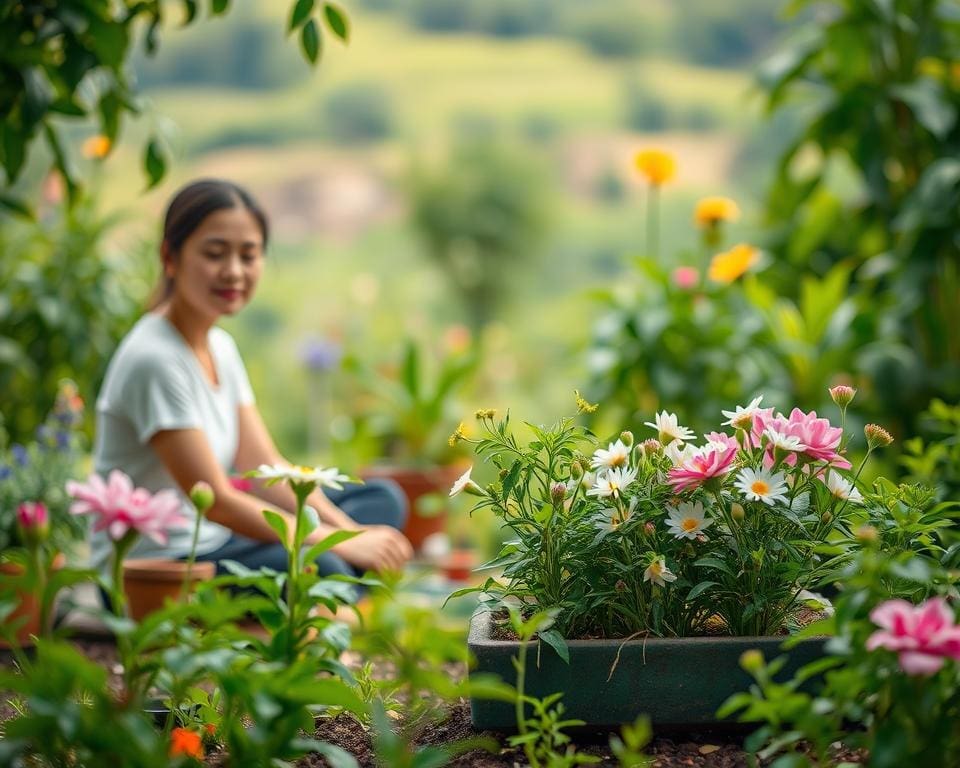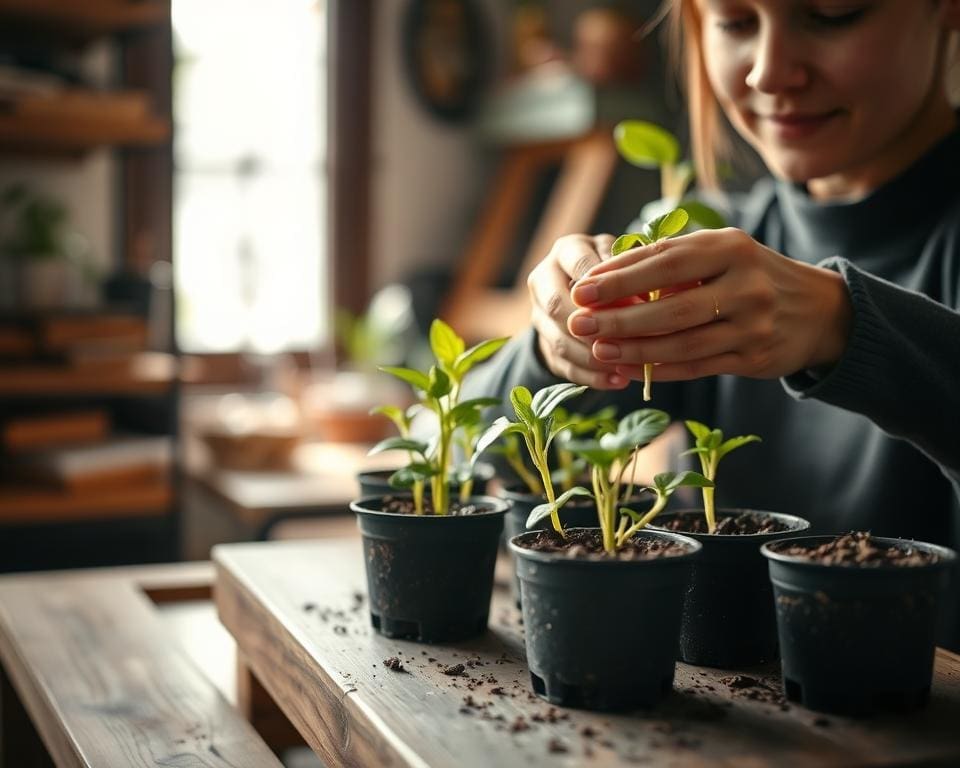The act of potting up seedlings is more than a mere gardening chore; it can be a profound form of therapy. Engaging with plants, especially in their early stages, fosters a unique bond that provides mental and emotional relief. The nurturing process inherent in gardening therapy resonates deeply with individuals seeking solace and connection with nature. Research highlights the therapeutic benefits of gardening, showing that the simple act of potting up seedlings can significantly enhance mental health. As one tends to young plants, the psychological effects can lead to reduced stress and an uplifted mood, making it a powerful tool for those navigating mental health challenges.
The Therapeutic Benefits of Gardening
Gardening offers a wealth of therapeutic benefits that extend beyond the simple act of planting and nurturing. Engaging in gardening therapy provides individuals with a structured method to improve both physical and mental wellbeing. The time spent interacting with nature fosters a calming environment, contributing to reduced anxiety and brighter moods.
Understanding Gardening Therapy
This approach to healing encourages participants to connect deeply with the earth, utilising the practices of planting, watering, and cultivating. Those involved in gardening therapy report heightened feelings of accomplishment and purpose. The practice promotes mindfulness, allowing individuals to focus on the task at hand while disconnecting from everyday stresses. As a tool for emotional resilience, it taps into the restorative power of green spaces.
Mental Health Benefits of Gardening
The mental health benefits of gardening are profound. Activities associated with gardening therapy not only alleviate symptoms of depression but also instil a sense of belonging and community. Engaging in this green therapy fosters social interactions, enabling individuals to forge connections with others who share similar interests. Simple tasks like sowing seeds or tending to flowers can promote emotional stability, making it a vital practice for enhancing mental health.

Is potting up seedlings a form of therapy?
The act of potting up seedlings can be a deeply satisfying experience, providing not only a sense of accomplishment but also serving as a form of therapy. This engaging process connects individuals with nature, allowing them to focus and engage their senses, which plays a crucial role in promoting mental wellbeing.
How Potting Up Benefits Mental Wellbeing
Is potting up seedlings a form of therapy? Yes, it can be characterised as such due to its myriad benefits. The meticulous attention required for seedling therapy cultivates a calming routine, allowing individuals to escape from the stresses of daily life. The feel of warm soil, the gentle scent of plants, and the vibrant colours can ground people in the moment, promoting mindfulness and enhancing emotional health. Healing through gardening creates a sanctuary where one’s thoughts can relax and float freely.
Process of Potting Up Seedlings
The process of potting up seedlings involves several straightforward steps, each of which can contribute to the meditative experience of plant therapy. It begins with selecting suitable pots that allow for optimal drainage to promote healthy growth. Following this, choosing the right soil composition becomes essential; a blend rich in nutrients supports the young plants effectively. Finally, transferring the seedlings from their original containers to their new homes encourages a nurturing connection between the gardener and the plants. This interaction instils a sense of purpose, reinforcing the therapeutic benefits of gardening.
Horticultural Therapy: A Path to Healing
Horticultural therapy represents a unique intersection between gardening and wellness, where the act of nurturing plants fosters mental and physical healing. This practice capitalises on the therapeutic benefits of gardening, encouraging individuals to engage with nature in a way that promotes a sense of wellbeing. Through structured gardening activities, horticultural therapy helps to enhance health outcomes for various individuals.
Defining Horticultural Therapy
At its core, horticultural therapy utilises gardening activities to support rehabilitation and improve quality of life. Participants can engage in planting, cultivating, and caring for plants, each action offering a sense of accomplishment and control. This can be especially beneficial for those dealing with chronic illnesses or mental health challenges. The combination of fresh air, physical activity, and the beauty of nature aids in reducing stress and enhancing emotional resilience.
Success Stories in Horticultural Therapy
Numerous success stories highlight the transformative effects of garden therapy across the UK. Individuals who have participated in programmes run by organisations like Thrive have reported significant improvements in their mental health, social skills, and overall sense of purpose. These personal accounts often illustrate how the natural elements of gardening provide comfort and promote healing, showcasing the profound impact of horticultural therapy on life quality.
The Role of Green Therapy in Modern Life
As urban landscapes expand and daily life becomes increasingly hectic, the quest for balance and tranquillity often leads individuals to discover green therapy. This form of healing harnesses the calming presence of nature, providing a refuge from the demands of modern living. Engaging in the therapeutic benefits of gardening allows individuals to reconnect with their surroundings, offering a path to improved mental wellbeing.
Exploring Green Therapy Concepts
Green therapy encompasses a variety of practices focusing on nature as a healing medium. Whether through the act of sowing seeds, nurturing plants, or simply walking in a park, these interactions foster a deeper bond with the environment. The therapeutic benefits of gardening not only promote physical activity but also stimulate the mind, enhancing emotional resilience and encouraging positive thinking.
Connecting with Nature through Gardening
Gardening serves as a tangible way to immerse oneself in nature, a connection increasingly vital in our fast-paced lives. Studies highlight the mental health benefits of gardening, noting reductions in stress and anxiety levels. Spending time in green spaces can elevate mood, improve concentration, and reduce fatigue. This simple yet powerful act encourages individuals to establish a routine that prioritises interaction with the natural world, ultimately leading to greater peace of mind.
Healing Through Gardening: A Simple Yet Powerful Act
Gardening, particularly the act of potting up seedlings, provides more than just a pleasant pastime; it is a gateway to profound healing through gardening. Engaging with the earth and nurturing living plants can foster a sense of calm and connection to the natural world, allowing individuals to experience the myriad therapeutic benefits of gardening. This interaction not only beautifies our surroundings but also cultivates mental resilience and emotional balance.
The therapeutic benefits of gardening extend beyond mere stress relief. Research highlights that gardening therapy can alleviate symptoms of anxiety and depression while promoting mindfulness. As individuals immerse themselves in the process, whether it’s sowing seeds or tending to seedlings, they often discover an oasis of tranquility that facilitates improved mental wellbeing. Each small action serves as a reminder of the positive impact that nurturing can have, fostering both growth in plants and in oneself.
Incorporating gardening into daily routines can act as a powerful catalyst for enhancing mental health benefits of gardening. It encourages reflection, provides a sense of purpose, and inspires creativity, making it clear that these simple acts can lead to invaluable insights and emotional breakthroughs. As society continues to explore and embrace the importance of mental health, the conversation around healing through gardening becomes ever more relevant, pushing us to see gardening not merely as a hobby, but as a vital form of therapy that enriches lives.









